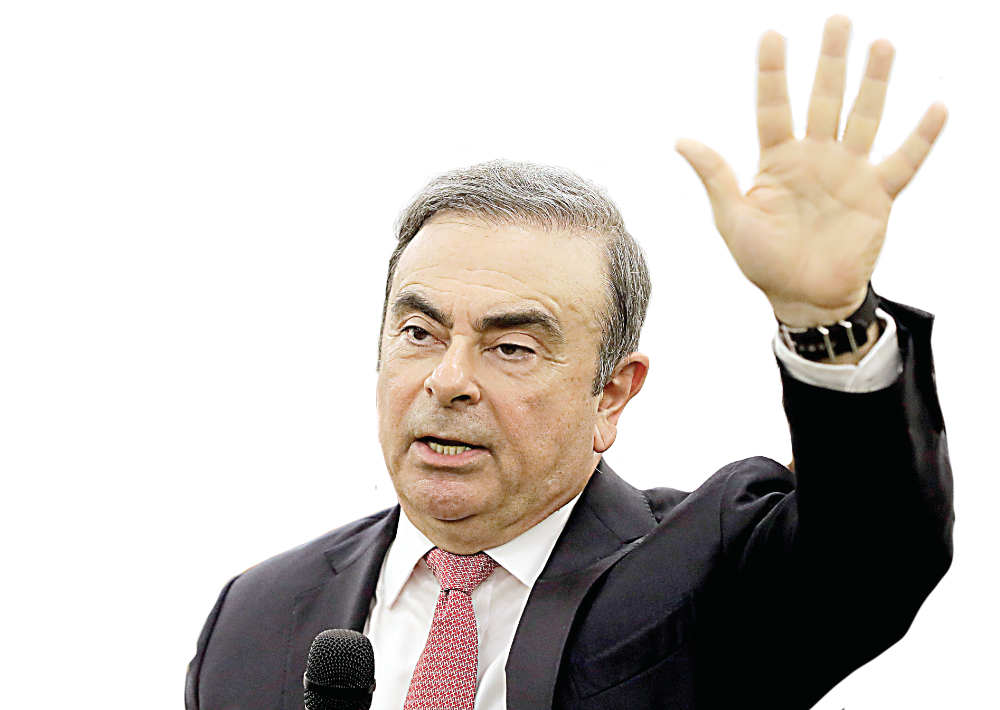TOKYO: His boss Carlos Ghosn escaped financial misconduct charges by fleeing the country, but another former Nissan executive is still awaiting trial in Japan: Greg Kelly.
Kelly’s trial in Tokyo District Court is to open Sept. 15, nearly two years after his arrest, and the day he turns 64. If convicted of charges related to alleged under-reporting of Ghosn’s income, Kelly could face up to a decade in prison.
Even if acquitted, he has already paid a heavy price, unable to leave Japan and go home to Tennessee while out on bail. He has yet to see his newborn grandchild. His wife got a student visa to stay with him in Tokyo. Kelly, like Ghosn, says he is innocent.
Tokyo prosecutors say Kelly and Ghosn, the former chairman of Nissan Motor Co., violated financial laws by under-reporting Ghosn’s pay by about 9 billion yen ($85 million) from 2011 through 2018.
Jamie Wareham, Kelly’s lawyer in the US, says a compensation agreement was never finalized. He believes the real motive was a “corporate coup” to oust Ghosn by others at Nissan who feared he might engineer a takeover by its French alliance partner, Renault.
“The whole thing is a fraud,” Wareham told The Associated Press by phone.
Ghosn could have been a star witness for the defense. But he is gone, having fled to Lebanon late last year, hidden in a box aboard a private jet.
“He is frustrated. He is upset,” Wareham said of Kelly. “He has been abused from the beginning by the Japanese system.”

Disgraced Renault-Nissan boss Carlos Ghosn. (AFP)
Nissan’s US division hired Kelly, who has a law degree, in 1988. He became a representative director in 2012, the first American on Nissan’s board. Kelly worked in legal counsel and human resources at the company. He was arrested in November 2018, upon his arrival from the US in Japan, thinking he was going to attend Nissan meetings.
Kelly has not been charged with breach of trust allegations that Ghosn is facing, which center around suspected use of Nissan money for personal purposes, including fancy homes. Ghosn’s lawyers have argued the properties were needed for work, and contend that such questions could have been raised internally at the company and did not require prosecution.
Tokyo Deputy Chief Prosecutor Hiroshi Yamamoto said the preparations for Kelly’s trial took a long time because of the massive amounts of evidence involved.
“We feel we have a solid case with ample evidence to win a guilty verdict,” Yamamoto told reporters recently.
FASTFACT
Tokyo prosecutors allege Kelly and Ghosn, the former chairman of Nissan Motor Co., violated financial laws by under-reporting Ghosn’s pay by about 9 billion yen ($85 million) from 2011 through 2018.
Wareham, Kelly’s counsel, said prosecutors have sent the equivalent of a billion pages of documents, mostly in English, that can only be examined on a computer at the Tokyo legal team’s office. They have yet to hand over more than 70 7-inch-size boxes full of material marked as evidence, with only two weeks left before the trial opens.
Wareham said Kelly’s treatment has been unfair, but he is confident Kelly will be vindicated because he is so “obviously innocent,” he said.
Nissan was charged as a company, and Nissan and Kelly will be tried together. Nissan has acknowledged guilt and made changes to the statements on compensation. It was fined 2.4 billion yen ($22.6 million) fine but still faces related charges.
In a trial likely to last about a year, Nissan employees, including former Nissan Chief Executive Hiroto Saikawa, are expected to testify in support of the prosecutors. Saikawa replaced Ghosn but resigned last year over financial misconduct allegations of his own. He has not been charged.
Separately, Japan is seeking the extradition of two Americans, Michael Taylor and his son Peter Taylor, wanted on charges of smuggling Ghosn out of Japan. They are being held in a Massachusetts jail without bail.
Ghosn has repeatedly slammed Japan’s court system, denouncing it as “hostage justice.”
That is a widespread criticism, given that the conviction rate is above 99 percent. Suspects are routinely grilled by police or prosecutors without a lawyer present and held for months before trial, a practice that critics say leads to false confessions and lacks a presumption of innocence.
At the heart of the whole Ghosn saga is the tendency for Japanese executives to be paid far less than their Western counterparts, while they work more as part of “salaryman” teams than as powerful leaders.
In 2010, when Japan started requiring the public disclosure of individual executives’ pay, Ghosn’s $9.5 million annual salary raised eyebrows.
Ghosn defended his higher than usual compensation as what he deserved for what he had achieved at Nissan, leading its turnaround from the brink of collapse after he was sent by Renault in 1999.
Since Japan has no extradition treaty with Lebanon, it’s unlikely Ghosn will ever face trial. But his legacy at Nissan is likely to overshadow Kelly’s trial.
“My prayers go to Greg Kelly and his family who remain trapped by the Japanese Hostage Justice System,” Ghosn said in a tweet earlier this year.
























